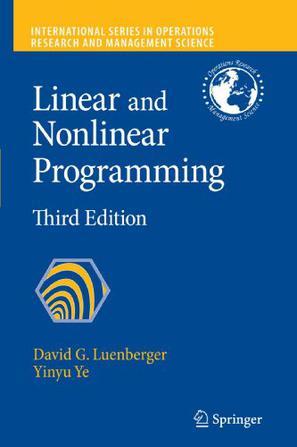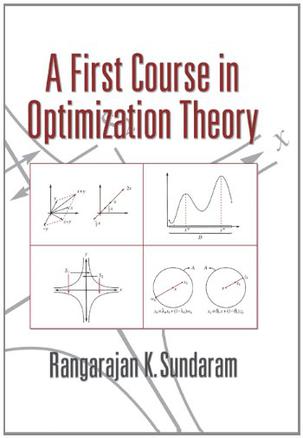-

Integer and Combinatorial Optimization
Rave reviews for INTEGER AND COMBINATORIAL OPTIMIZATION "This book provides an excellent introduction and survey of traditional fields of combinatorial optimization . . . It is indeed one of the best and most complete texts on combinatorial optimization . . . available. [And] with more than 700 entries, [it] has quite an exhaustive reference list."-Optima "A unifying approach to optimization problems is to formulate them like linear programming problems, while restricting some or all of the variables to the integers. This book is an encyclopedic resource for such formulations, as well as for understanding the structure of and solving the resulting integer programming problems."-Computing Reviews "[This book] can serve as a basis for various graduate courses on discrete optimization as well as a reference book for researchers and practitioners."-Mathematical Reviews "This comprehensive and wide-ranging book will undoubtedly become a standard reference book for all those in the field of combinatorial optimization."-Bulletin of the London Mathematical Society "This text should be required reading for anybody who intends to do research in this area or even just to keep abreast of developments."-Times Higher Education Supplement, London Also of interest . . . INTEGER PROGRAMMING Laurence A. Wolsey Comprehensive and self-contained, this intermediate-level guide to integer programming provides readers with clear, up-to-date explanations on why some problems are difficult to solve, how techniques can be reformulated to give better results, and how mixed integer programming systems can be used more effectively. 1998 (0-471-28366-5) 260 pp. -

Linear and Nonlinear Programming
This third edition of the classic textbook in Optimization has been fully revised and updated. It comprehensively covers modern theoretical insights in this crucial computing area, and will be required reading for analysts and operations researchers in a variety of fields. The book connects the purely analytical character of an optimization problem, and the behavior of algorithms used to solve it. Now, the third edition has been completely updated with recent Optimization Methods. The book also has a new co-author, Yinyu Ye of California's Stanford University, who has written lots of extra material including some on Interior Point Methods. -

Nonlinear Programming
COMPREHENSIVE COVERAGE OF NONLINEAR PROGRAMMING THEORY AND ALGORITHMS, THOROUGHLY REVISED AND EXPANDED Nonlinear Programming: Theory and Algorithms—now in an extensively updated Third Edition—addresses the problem of optimizing an objective function in the presence of equality and inequality constraints. Many realistic problems cannot be adequately represented as a linear program owing to the nature of the nonlinearity of the objective function and/or the nonlinearity of any constraints. The Third Edition begins with a general introduction to nonlinear programming with illustrative examples and guidelines for model construction. Concentration on the three major parts of nonlinear programming is provided: Convex analysis with discussion of topological properties of convex sets, separation and support of convex sets, polyhedral sets, extreme points and extreme directions of polyhedral sets, and linear programming Optimality conditions and duality with coverage of the nature, interpretation, and value of the classical Fritz John (FJ) and the Karush-Kuhn-Tucker (KKT) optimality conditions; the interrelationships between various proposed constraint qualifications; and Lagrangian duality and saddle point optimality conditions Algorithms and their convergence, with a presentation of algorithms for solving both unconstrained and constrained nonlinear programming problems Important features of the Third Edition include: New topics such as second interior point methods, nonconvex optimization, nondifferentiable optimization, and more Updated discussion and new applications in each chapter Detailed numerical examples and graphical illustrations Essential coverage of modeling and formulating nonlinear programs Simple numerical problems Advanced theoretical exercises The book is a solid reference for professionals as well as a useful text for students in the fields of operations research, management science, industrial engineering, applied mathematics, and also in engineering disciplines that deal with analytical optimization techniques. The logical and self-contained format uniquely covers nonlinear programming techniques with a great depth of information and an abundance of valuable examples and illustrations that showcase the most current advances in nonlinear problems. -

Convex Optimization Theory
-

Dynamic Optimization
在线阅读本书 The long awaited second edition of Dynamic Optimization is now available. Clear exposition and numerous worked examples made the first edition the premier text on this subject. Now, the new edition is expanded and updated to include essential coverage of current developments on differential games, especially as they apply to important economic questions; new developments in comparative dynamics; and new material on optimal control with integral state equations. The second edition of Dynamic Optimization provides expert coverage on:- methods of calculus of variations - optimal control - continuous dynamic programming - stochastic optimal control -differential games. The authors also include appendices on static optimization and on differential games. Now in its new updated and expanded edition, Dynamic Optimization is, more than ever, the optimum choice for graduate and advanced undergraduate courses in economics, mathematical methods in economics and dynamic optimization, management science, mathematics and engineering. New features of Dynamic Optimization will show students:advances in how to do comparative dynamics; how to optimally switch from one state equation to another during the planning period; how to take into account the history of the system governing an optimization problem through the use of an integral state equation; and how to apply differential games to problems in economics and management sciences. -

A First Course in Optimization Theory
This 1996 book introduces students to optimization theory and its use in economics and allied disciplines. The first of its three parts examines the existence of solutions to optimization problems in Rn, and how these solutions may be identified. The second part explores how solutions to optimization problems change with changes in the underlying parameters, and the last part provides an extensive description of the fundamental principles of finite- and infinite-horizon dynamic programming. Each chapter contains a number of detailed examples explaining both the theory and its applications for first-year master's and graduate students. 'Cookbook' procedures are accompanied by a discussion of when such methods are guaranteed to be successful, and, equally importantly, when they could fail. Each result in the main body of the text is also accompanied by a complete proof. A preliminary chapter and three appendices are designed to keep the book mathematically self-contained.